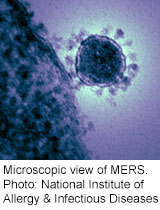- Could Your Grocery Store Meat Be Causing Recurring UTIs?
- Are You Making This Expensive Thermostat Error This Winter?
- Recognizing the Signs of Hypothyroidism
- 10 Strategies to Overcome Insomnia
- Could Artificial Sweeteners Be Aging the Brain Faster?
- Techniques for Soothing Your Nervous System
- Does the Water in Your House Smell Funny? Here’s Why
- Can a Daily Dose of Apple Cider Vinegar Actually Aid Weight Loss?
- 6 Health Beverages That Can Actually Spike Your Blood Sugar
- Treatment Options for Social Anxiety Disorder
MERS Virus Did Not Spread in 2 U.S. Cases: Health Officials


The potentially deadly MERS virus did not spread from two patients in the United States to any people in their homes or to health care workers who treated them, federal health officials said Tuesday.
The cases of MERS (Middle East Respiratory Syndrome) in Indiana and in Florida involved patients who worked as health care providers in Saudi Arabia, the epicenter of the MERS outbreak. It’s believed that’s where they were infected, the Centers for Disease Control and Prevention said.
The case in Florida involved a 44-year-old health care worker from Saudi Arabia who traveled to Orlando, where he began having symptoms on May 9. He recovered and was discharged from the hospital on May 19, the CDC reported.
The Indiana case involved a health care worker who had traveled to Saudi Arabia and then returned to the United States before falling ill and being hospitalized in Indiana. That patient was released from the hospital on May 9.
These are the only two known cases of MERS documented in the United States.
MERS kills about one-quarter of the people who contract the virus. Symptoms typically include shortness of breath, coughing and fever, according to the CDC.
The two cases were confirmed by the CDC in May. As part of its investigation, the agency collected samples from people who lived in the patients’ homes, as well as the health care workers who had close contact with them. None of them has tested positive for current or previous infection with MERS, the CDC said.
The findings are reassuring, because they show a low risk of person-to-person transmission of the virus, according to Dr. David Swerdlow, who is leading the CDC’s response to MERS.
While the risk is low, “it is important that we remain vigilant and quickly identify and respond to any additional importations,” of the virus, he said in a CDC news release.
In addition to testing members of the patients’ households and health care teams, the CDC and other health agencies have contacted nearly all of the people who traveled on airplanes or buses with the two patients.
None of the fellow passengers who were tested showed any sign of being infected with MERS. However, investigations and voluntary testing are continuing and the situation could change, the CDC said.
In the meantime, MERS cases continue to mount in the Middle East and elsewhere. According to the latest update released by the World Health Organization on June 16, there were 701 laboratory-confirmed cases of MERS reported globally, including at least 249 deaths.
The CDC outlined a number of everyday ways to protect yourself from MERS and other viruses that cause respiratory illness: wash your hands often, don’t touch your face with unwashed hands, avoid close contact with people who appear ill, and clean frequently touched surfaces.
More information
The U.S. Centers for Disease Control and Prevention has more about MERS.
Source: HealthDay
Copyright © 2026 HealthDay. All rights reserved.










